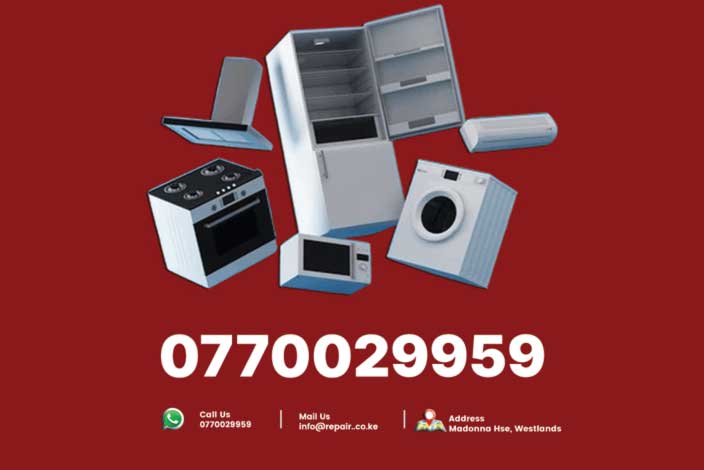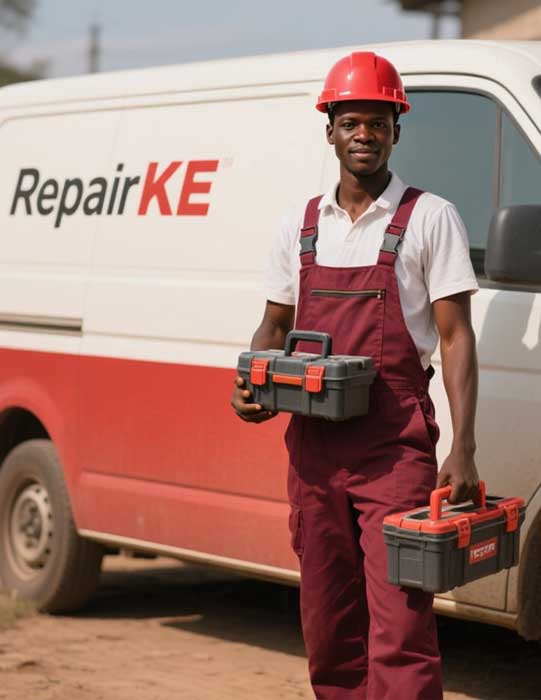Heater Repair Tips for Common Faults and Problems
By Repair.co.ke
Heaters are essential for keeping homes warm, especially during chilly seasons. However, like any appliance, they can develop faults that disrupt their performance. At Repair.co.ke, we’ve compiled a list of common heater problems, their causes, and practical repair tips to help you restore warmth to your home. These tips are designed for both electric and gas heaters, but always prioritize safety—consult a professional for complex issues or if you’re unsure.
1. Heater Not Turning On
Problem
Your heater doesn’t start, and there’s no heat output.
Causes
- Power supply issues (electric heaters)
- Tripped circuit breaker or blown fuse
- Thermostat malfunctions
- Pilot light or ignition issues (gas heaters)
Repair Tips
- Check Power Supply: Ensure the heater is plugged in and the outlet is functional. Test the outlet with another device.
- Inspect Circuit Breaker: Reset any tripped breakers or replace blown fuses in your electrical panel.
- Examine Thermostat: Verify that the thermostat is set to “heat” mode and the temperature is higher than the room’s current temperature. Replace batteries if it’s a battery-powered thermostat.
- Gas Heaters: If the pilot light is out, follow the manufacturer’s instructions to relight it. For electronic ignition systems, check for error codes on the display panel.
- Safety First: If you suspect a gas leak (smell of rotten eggs), turn off the gas supply, ventilate the area, and contact a professional immediately.
2. Insufficient Heat Output
Problem
The heater runs but doesn’t produce enough heat to warm the space.
Causes
- Dirty air filters
- Blocked vents or ducts
- Undersized heater for the room
- Faulty heating element (electric) or burner (gas)
Repair Tips
- Clean or Replace Filters: Dirty filters restrict airflow, reducing efficiency. Clean reusable filters or replace disposable ones every 1–3 months.
- Clear Vents and Ducts: Ensure vents, radiators, or ducts are free from obstructions like furniture or dust buildup. Vacuum or dust them regularly.
- Check Heater Capacity: Confirm your heater’s wattage or BTU rating matches the room size. A 1500-watt heater typically warms about 150–200 square feet.
- Inspect Heating Element/Burner: For electric heaters, a multimeter can test the heating element’s continuity. For gas heaters, check the burner for clogs or corrosion. Professional assistance is recommended for replacements.
3. Strange Noises
Problem
The heater makes unusual sounds like banging, rattling, or humming.
Causes
- Loose components
- Air in the system (for hydronic heaters)
- Dirty burners or fan blades
- Worn-out motor bearings
Repair Tips
- Tighten Loose Parts: Check for loose screws, panels, or fan blades and tighten them with a screwdriver or wrench.
- Bleed Radiators (Hydronic Systems): If you hear gurgling or banging, air may be trapped. Use a radiator key to bleed the system, releasing trapped air.
- Clean Burners/Fans: Dust or debris on burners or fan blades can cause rattling. Turn off the heater, let it cool, and clean with a soft brush or compressed air.
- Lubricate Motor: If the motor is humming, it may need lubrication. Refer to the manual for the correct lubricant type and application method. Replace the motor if bearings are worn out (professional help advised).
4. Heater Cycling On and Off Frequently
Problem
The heater turns on and off too quickly, known as short cycling.
Causes
- Overheating due to restricted airflow
- Faulty thermostat
- Incorrectly sized heater
- Gas valve or electrical issues
Repair Tips
- Improve Airflow: Ensure filters, vents, and ducts are clean and unobstructed.
- Relocate Thermostat: If the thermostat is near a heat source (e.g., a sunny window), it may misread the room temperature. Move it to a central, shaded location.
- Check Heater Sizing: An oversized heater can cause short cycling. Consult a professional to assess if your heater matches your space’s needs.
- Inspect Electrical/Gas Components: Faulty wiring or gas valves can trigger short cycling. This requires professional diagnosis and repair.
5. Thermostat Not Working Properly
Problem
The heater doesn’t respond to thermostat settings, or the temperature is inconsistent.
Causes
- Dead batteries
- Miscalibrated thermostat
- Wiring issues
- Sensor malfunctions
Repair Tips
- Replace Batteries: Swap out batteries in battery-powered thermostats.
- Recalibrate Thermostat: If it’s an older model, recalibrate it per the manufacturer’s instructions or replace it with a modern digital thermostat.
- Check Wiring: Loose or corroded wires can disrupt communication. Turn off power and inspect connections, but hire a technician for complex wiring issues.
- Test Sensors: If the thermostat has a remote sensor, ensure it’s clean and properly positioned. Replace if faulty.
6. Foul Odors from Heater
Problem
The heater emits unpleasant smells, such as burning or chemical odors.
Causes
- Dust buildup (common when first used in the season)
- Gas leaks (rotten egg smell)
- Electrical burning (melted wiring or components)
Repair Tips
- Dust Burn-Off: A burning smell is normal when a heater is first turned on after a long period. Run it for 10–15 minutes in a well-ventilated space to burn off dust.
- Check for Gas Leaks: If you smell gas, shut off the heater, open windows, and contact a professional immediately. Do not use electrical switches, as they could ignite the gas.
- Inspect Electrical Components: A persistent burning smell may indicate overheating wires or components. Turn off the heater and call a technician.
Safety Precautions
- Always Turn Off Power/Gas: Before inspecting or repairing, disconnect the heater from its power source or gas supply.
- Use Proper Tools: A multimeter, screwdriver, or radiator key may be needed for basic repairs.
- Know Your Limits: Complex issues like gas valve repairs, electrical faults, or major component replacements should be handled by certified professionals.
- Regular Maintenance: Schedule annual heater maintenance to prevent faults and improve efficiency.
When to Call a Professional
If troubleshooting doesn’t resolve the issue, or if you encounter gas leaks, electrical faults, or complex repairs, contact a professional technician. At Repair.co.ke, we connect you with skilled experts to ensure your heater operates safely and efficiently.
By addressing common heater faults promptly, you can extend the lifespan of your appliance and maintain a cozy home. Regular maintenance, such as cleaning filters and checking thermostats, prevents many issues. For persistent or hazardous problems, don’t hesitate to seek professional help. Visit Repair.co.ke for expert heater repair services and more home appliance tips.
Disclaimer: Always follow manufacturer guidelines and prioritize safety when performing repairs. Repair.co.ke is not liable for any damages or injuries resulting from DIY repairs.






